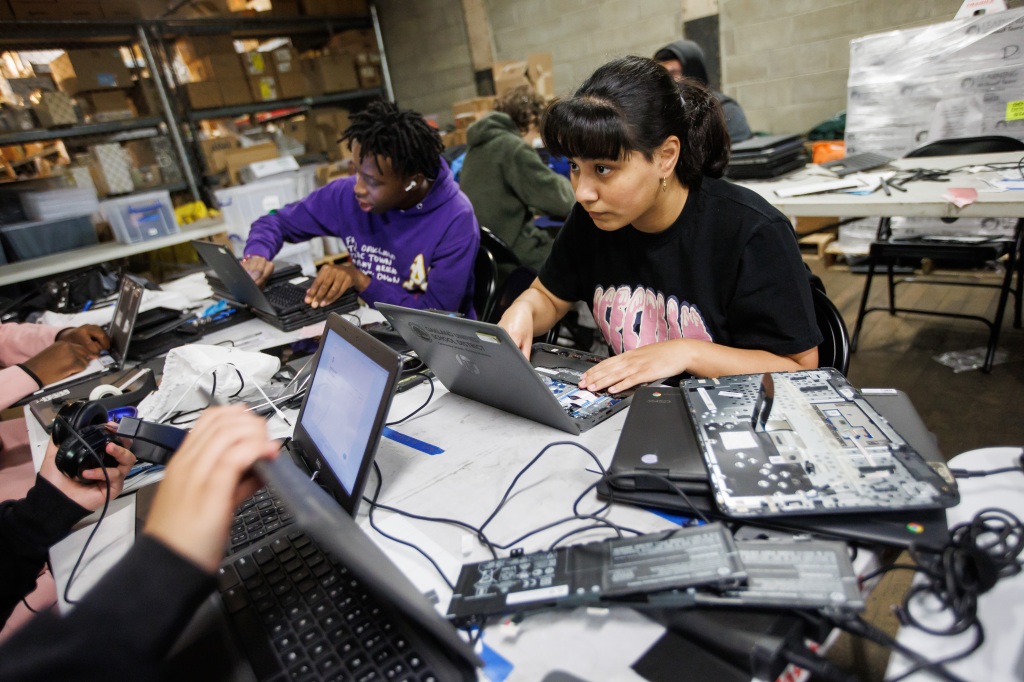There are few things quite as emblematic of late stage capitalism than the concept of “planned obsolescence”.
“These updates depend on many device-specific non-Google hardware and software providers that work with Google to provide the highest level of security and stability support,” said Peter Du, communications manager for ChromeOS. “For this reason, older Chrome devices cannot receive updates indefinitely to enable new OS and browser features.”
Bull. Shit.
I have an 8 year old iPad that can still use Amazon video and can still run Netflix, and google drops support for these computers as early as 3 years. I’m not an Apple fanboy but that is absolutely ridiculous.
Apple does the same thing if you don’t already have those installed
My 2nd gen Apple TV is garbage. Nearly all the apps fail to load now. 🤷♂️… I suppose I can try jailbreaking it but it sure feels like someone is trying to force me to upgrade my hardware.
That’s a product that hasn’t had an Apple update since 2014. What realistically do you expect hardware manufacturers to do with actually old hardware? Lose money supporting it forever? This is kind of the opposite case from the chromebooks.
You’re also not a giant customer who needs security and it services like a school district. 3 years might be early, idk, but in plenty of enterprise or institutes replace their hardware every so often.
Hih
My 2012 laptop runs windows 10 perfectly fine and has the latest security updates. We’re way past the point of using hardware limitations as an excuse for companies to drop support early.
I don’t see why a school should have to replace their basic computers with an equally basic computer after 3 years unless it’s broken beyond repair. I don’t think the OS itself is doing much more than what an enterprise copy of windows does for security.
Funny you should say this. I have a 2012 Retina Macbook Pro, and yes it is running Windows or Linux with all the latest updates. However, Apple stopped supporting it in 2020. It’s too old for MacOS updates.
I’ve even seen a guide that will allow me to hack past the normal BIOS restrictions/allow me to put Windows 11 on it.
I have a Mac Mini that has to be dumped because Apple is no longer providing OS updates to it. Just because you can continue to use it doesn’t mean it’s a good idea to do so. iOS and OSX are being increasingly targeted especially as the inertia against upgrading systems that work just fine is highest among the technologically illiterate.
What year is the mini from? I run a Plex server off a 2010 Mac mini.
Apple devices are serviceable for far longer after the OS stops updating than windows/android devices in my experience. But regardless, Apple doesn’t discontinue support as early as 3 or 4 years. Even you have to admit that is ridiculous of google.
I have a 15 year old laptop that can still browse the web and play YouTube videos just fine because PC is a standardized platform with an open standard bootloader and a BIOS/UEFI system designed to abstract the hardware so the OS doesn’t have to be tailor-made to the hardware. Mobile devices are absolute shit in this regard. Why does the OS have to be specifically built to target one particular device?
It shouldn’t. End of question. This applies to Android, ChromeOS, and Apple devices equally.
I’m glad mobile Linux is starting to take off and there seem to be some standards emerging around ARM booting, even if it is still an absolute shit show compared to the standardization of UEFI/BIOS on x86/x86-64. I know some ARM systems can UEFI boot but it’s few and far between still so most devices still need a tailored kernel at least. That said, ARM Linux doesn’t need the entire freaking stack tailored to a device like Android and iOS do.
Couldn’t agree more. Every computer I have, no matter how old, can connect and do most things fine.
I will give credit to Apple on that one because android phone manufacturers are now supporting their phone for longer because of how long Apple is supporting them.
I remember back in the day when I had apple devices where they would push updates for devices long past their capability to actually run the updated software. Rather than refuse the update or get a pruned patch with security fixes only, it would force updates and bloat your phone and grind it into unresponsive unusability after a few years.
I hear that’s not so much the case anymore, so that’s nice. But I remember. The main reason I upgraded my phone was because of that, the hardware was great, but I could hardly use the software anymore even after clean installs.
My point being, I guess, extended support is great if managed properly but it can also become a bludgeon with which to drive you toward the new generations of devices.
long past their capability to actually run the updated software
Well, Apple intentionally slowed those devices down to make the users update, instead of using an insecure device, that would’ve provided a good experience otherwise.
And these days Apple is retiring devices arbitrarily for profits too. For example this year they are retiring the Iphone 8, which has better hardware, than the ipad 2018 that is still being supported…
That slowness was, at least officially, for the battery health. Do you have the support to prove otherwise?
These conversations bring the weirdest people out of the woodwork. I remember talking with a guy who explained to me how crap Apple laptops were because you (according to him) can’t customise them. Turns out he’d never owned or even used an Apple laptop. I was like, why do you care?! Especially about something you have no experience with!
And then if I recall correctly (though I can’t be bothered to look) didn’t they get sued for slowing phones?
So people were mad that their phones battery wasn’t holding a charge anymore, “im being forced to upgrade”, so Apple throttled older phones to keep the battery running, aka allowing people to keep their phones longer, and then they got sued for slowing down phones lol.
I am an apple fan boy, I wont hide that. But it does seem like they tried to do a “good” and make peoples phones last longer, and then got sued.
Also the whole forced upgrade just isn’t apples game IMO. Do they want you buying the new one every year, of course. But the more important thing is that you keep using AN iPhone at all. Stay in the ecosystem, stay in the app store, stay paying for icloud, etc.
Going to a new phone gives the user a window to move away from IOS. (Though most won’t haha)
I think the more probable reason is that EU regulators were unhappy with this for a long time and have now put 3 years of OS updates and 5 years of security updates into law. Low cost Android manufacturers don’t care what Apple does.
Weeell “bullshit” is easy to claim but not necessarily untrue. So with android phones this is definitely a problem. Industry wide firmware support for these ARM SOC-s are often ranging from not long enough, to fucking atrocious. You get basically two years of new drivers, and a security update maybe. The way LinageOS manages to support phones like the note 3, from like android 4, to 11, is basically creating manifests, that use drivers from newer, still supported, but “similar-ish” components. And the note 3 was a flagship device, easily the fastest phone of it’s generation. These Chromebooks, especially the ones schools can and do afford, are built to the penny. There is ultimately no point in pushing a software update to a device for a significant cost, that makes it so slow that no reasonable person would ever consider using it.
What is the solution to this? Hard to say. Not buying hardware so incredibly obsolete that it has to run an alternate OS, is a start. Maybe just use PC-s and deploy linux.
I manage my schools IT - and when we started out a few years ago my board were pushing aggressively for Chromebooks. The service provider were talking about how they could roll out hundreds of Chromebooks at the touch of a button. When I asked about the lifespan of a Chromebook I got vague answers. I knew we would get a couple of years max out of each one so I instead pushed for much more expensive MacBooks. 5 years on and we are still using our original MacBook we got back then, with photoshop and other software.
x86 Macs are not the greatest example of longevity at this point.
Not ideal that we had a percentage of our MacBooks on x86 cpus when the M1’s came out. But I will say they are still running strong. Others have pointed out that newer OS updates won’t work on the older MacBooks. But that’s not a deal breaker for us as we don’t run anything that’s OS specific enough to make the older models obsolete. We have factored in 5 - 7 years of use out of the laptops and we’re on course for that. I myself and using a 10 year old MacBook at home, and although I can’t fire up the latest Adobe Premiere on it, I can certainly get 99% of my work done on it.
Ironically the only way to use some old Macbooks these days is to put Chrome OS Flex on them. Apple is far more aggressive about killing off old hardware when it feels like it. You can still use them as-is of course but over time the browser and other web based apps degrade and refuse to work because of issues with TLS, CA certs (expired), discontinued backend APIs and unsupported web content APIs.
Chromebooks expire? What the fuck? Are there logistical problems with installing Linux on these devices?
the Chromebooks with ARM processor (the majority of the cheaper ones) are notoriously known to be awful to install any alternative operating system
Not really, but it’s almost impossible for a school to pull that off and still get the support needed. Don’t forget that new Chromebooks are dirt cheap, after all discounts probably in the 100-200$/€ range. It’s (sadly) just not worth it salvaging them.
Honestly people should stop buying Google products…
This sounds like there’s a market for a Linux distro that behaves like ChromeOS and can be centrally managed.
The problem comes down to education institutions. I remember when we got Chromebooks in my highschool (8 years ago) admins forgot to turn of developer mode and half the school unenrolled the Chromebook managing to bypass all restrictions. This went on for half a year until one day our school needed to run a state exam (more for measure of schools performance not as a college entrance exam or anything).
The computerized testing program required deploying a specific chrome app accessible when chrome book is logged out (can’t just download from chrome web store). When they tried to push the client since half of Chromebooks were unenrolled it failed. This required the school it to recall pretty much all chrome books to manually re enroll all of them and disable developer mode (prevents unenrolling and prevents sideloading Linux).
Problem is if older Chromebooks are used for Linux in an educational environment there would be nothing stopping a student from whipping up a bootable USB and dumping another distro (bypassing restrictions). I’m also not sure if there is a enrollment mode equivalent Linux (there may be but not sure).
At least that’s my two cents (not a school it admin just a memory from the past 😉).
I never really understood the need for that strickt controll of the hardware… Who cares if Linux is sideloaded or if students unenroll. Imho I think if you need that strickt controll you are bound to get so many unnesseary issues down the line. Instead let student 6se what ever the fuck they want and for security just make sure they WiFi/ethernet is secure and locked down and any services the students need are behind a secure 2fa login. Treat any device as untrusted is more healthy for your security in the long run imo. If students need special software that they can’t run on their own machines you can lend them a machine for that specific task for a specific time. Problem solved.
I never really understood the need for that strickt controll of the hardware
Federal laws and rules for educational technology:
CIPPA - https://www.fcc.gov/consumers/guides/childrens-internet-protection-act
COPPA - https://www.ftc.gov/legal-library/browse/rules/childrens-online-privacy-protection-rule-coppa
and to an extent
FERPA - https://www2.ed.gov/policy/gen/guid/fpco/ferpa/index.html
Anyone know where I can buy or place bids on batches/pallets/etc of them? I want to self host a bunch of shit using those cheap computers that are being thrown out.
Same here!
still using things like Google Chrome or Chromebooks in 2023 is actually reckless behaviour. stuff like manifest v3 and the web integrity api just prove that google will use their monopoly to take over the open internet
Yes, why have we as a society allowed Google of all companies to take over something as important as public education? It’s downright dystopian.
All of these machines make for decent Linux laptops. I picked up an EOL Chromebook for $35 last year and installed Debian on it. Decent little machine. Not terribly fast but very useable.
These are Linux laptops. But yes, they’ll work better if you put your preferred distro on them.
Why are schools pushing so hard for enslaved Linux laptops?
I’m currently in the market for something like a Chromebook but I’m not buying one because of stuff like this.
Lenovo yoga 11e, with linux. They’re like 250 bucks and a great value. Tablet mode too. I prefer mine to my better laptops, honestly, because I don’t have to worry about it at all.
I am very happy using a surface go with Linux (used arch with GNOME for a while, now trying out KDE Neon for a change).
Good, maybe that will get them to stop using Chrome OS in schools, it has been a disaster for computer literacy in general.
The service life of the devices was known up-front. You can check for yourself the service life dates of every Chrome OS machine here:
https://support.google.com/chrome/a/answer/6220366?hl=en
The correct deployment strategy would be to make a big purchase at the front end of a device’s lifecycle and then only replacements from then on out so that you get the most out of every machine. Future capital purchases would be with a new device and termination date.
I think this point is really important, and allow me to go one step further: I work in the public sector of education and purchasing technology is such a complex issue that IT governance has to be involved with decisions like this. That’s to say that, without a governing body to review purchases (outside of whoever handles the actual procurement, i.e. funds leaving the bank account), mistakes like this will happen.
We can be upset with planned obsolescence, but there’s distinctly a human error here where there wasn’t enough research and planning.
Anyone got a non-paywalled version of the article?
Sorry! I didn’t realize it was paywalled because I could see the whole thing. Hopefully this should work:
If you are on ios device, using safari, tap the link and, you have to quick, tap the AA at the far left corner of the safari search (URL bar) while page is starting to load.
These things are such junk - even when new they were so slow and bloated that they couldn’t load my kid’s schoolwork half the time. I had to make sure he had an alternate laptop for use so he wouldn’t fall behind. I felt really bad for the school district, it was clear they were being ripped off, and that most of the machines were going to be in a landfill within 3 years time.
The article’s claiming the problem is planned-obsolete software, not inadequate hardware.
That’s their claim, but what’s in the old hardware?
That’s what they should be doing, but it isn’t what they’re going to do, unfortunately.
Kimathi Bradford, a 16-year-old Oakland tech repair intern, has looked into whether there was a way to replace the outdated Chromebook software with a non-Google brand, but it ended up being a lot of work, Kimathi said, and the open-source replacement wasn’t up to par. “It’s like the Fritos of software,” he said. “No one really wants to use it.”
Now, I’m not sure if what they tried was Linux, but I wouldn’t be too surprised. The younger generations grew up with smartphones; I feel as though operating systems will become more streamlined and opaque as time goes on. I suspect we’ll have to contend with the phonification of mainstream computing in the coming years.























